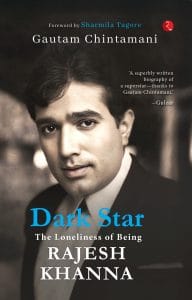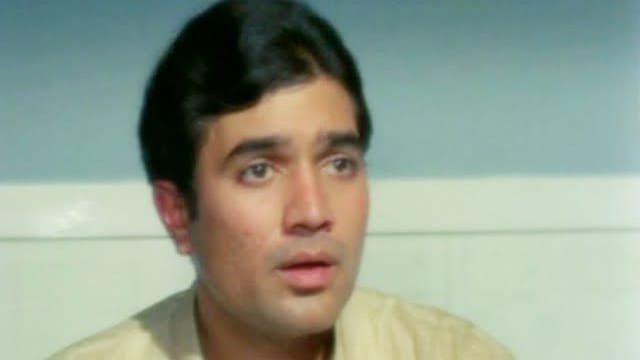Besides being amongst (Shammi) Kapoor’s last outings as the leading man, Andaz had also been one of the first films where (Rajesh) Khanna’s draw as a star was seen in its full glory. Kapoor had been fascinated by the West End production of the original French musical that he had seen years ago and wanted to play the lead but, by the time the project became a reality, he knew he was way past his prime. So, he picked Khanna for his version of the musical that—in a departure from the norm in Hindi cinema—would look at prostitution in an extremely light, even frivolous, manner.
Kicked about the prospect of playing the naïve cop, Khanna was looking forward to being a part of Kapoor’s whacky and naughty interpretation and suggested Salim-Javed’s name as writers.
Kapoor, however, had already begun working with veteran writer Abrar Alvi, whose credentials included most of Guru Dutt’s classics such as Pyaasa (1957), Kaagaz Ke Phool (1959) and Sahib, Bibi Aur Ghulam (1962) and wasn’t interested in Khanna’s suggestion. Khanna, nonetheless, continued to push for Salim-Javed and even suggested that the duo could work on the screenplay while Alvi could furnish the story, but Kapoor wouldn’t have any of it and cast Sanjeev Kumar instead.
While Khanna tried to get Salim-Javed associated with his projects, the two were more interested in doing their own number. Unlike others, Salim-Javed weren’t ready to put up with Khanna’s high-handedness though they kept the relationship as professional as possible. When Shakti Samanta was planning a film on the life of Palay Khan, the Koshti tribal leader who fought the British across the North-West Frontier Province in the 1930s, Khanna was an automatic choice to play the lead. Once again, Khanna suggested Salim-Javed and Samanta agreed to meet the duo since he wasn’t committed to any writer. The two met with Samanta and heard the kernel of the idea that had inspired Samanta.
At the end of the narration, they told Samanta that Palay Khan, being an action-oriented film, didn’t suit Khanna and he should look at someone like Dharmendra for the lead. Just as Salim-Javed left the project, the idea too left Samanta and it would be over a decade before the film would see the light of day with Jackie Shroff portraying the revolutionary. Though many projects like these never worked out for Khanna, they didn’t hurt him as much as the next film that the writer duo would write and which could have featured Khanna.
Also read:
By 1975, it was clear that both Amitabh Bachchan and action films were here to stay. By his own admission across sources, Khanna had realized this as well. Following Zanjeer and Namak Haraam, Bachchan was no longer the lanky struggler who occupied the end of the spectrum that had Khanna on the other extreme.
Bachchan’s 13 flops weren’t even being discussed when Khanna was delivering hit after hit; but now, with Salim-Javed batting for him, Amitabh was a totally different entity. With each subsequent release and its success, Salim-Javed were becoming as big as the stars who featured in their scripts. The first writers to have their names on a film’s poster, the two were treated like royalty and got as much attention as the biggest stars of the era and, in some cases, made more money than the actors they wrote for.
But what made them truly exceptional was that no writer before or since has had the kind of vetoing power Salim-Javed enjoyed when it came to casting. Yash Chopra was supposed to direct Deewar and, while the script was still being finalized, the idea of casting Khanna as Vijay and Navin Nischol as his younger brother Ravi was thrown in the air. People close to Khanna, such as Bhupesh Raseen, friend and frequent business associate since the late 1990s, recall how Khanna was an integral part of the script’s initial stages.
‘Many of Deewar’s iconic moments were discussed with Kakaji and his input was sought at almost every stage.’ But Salim Khan remembers it differently. ‘The production house had already signed Khanna for a film and, in that sense, producer Gulshan Rai was keen on casting him in their next production,’ says Khan, but insists that they never considered anyone besides Bachchan for Vijay. The political unrest that consumed the nation charged Salim-Javed with a passion that they hadn’t experienced before and they finished Deewar in 18 days flat once they got down to writing it.
They took even less time when it came to finalizing the casting. The two were adamant that Deewar could only work with Amitabh Bachchan as Vijay and no one else. They stuck to their gut instinct, but the stand they took looked more like a case of dismissing Khanna than batting for Bachchan.
In a joint interview with Bachchan for a film magazine 15 years later, Khanna minced no words in saying that although Yash Chopra wanted him, he had no choice but to settle for Bachchan as Salim-Javed refused to part with the script if he (Yash Chopra) didn’t cast Bachchan. Looking back, Bachchan makes more sense than Khanna playing Vijay, but the whole episode also made one thing very clear—Salim-Javed’s success only increased the distance between Khanna and the throne that he once occupied.
The achievements of his films had prompted him, with a little help from well-wishers like Devi, to propagate the whole numbers game as a new tool to gauge success, but he never realized that one day the same yardstick would be applied to him. By the end of 1974, there was hardly any doubt left that, regardless of hits like Aap Ki Kasam, Prem Nagar and Roti, Khanna’s stream of hits had dried up. The only major release he had in 1975 was Prem Kahani (1975) and it was, at best, an average grosser, if not a flop.
 This excerpt from Gautam Chintamani’s ‘Dark Star: The Loneliness of Being Rajesh Khanna’ has been published with permission from Rupa Publications.
This excerpt from Gautam Chintamani’s ‘Dark Star: The Loneliness of Being Rajesh Khanna’ has been published with permission from Rupa Publications.






